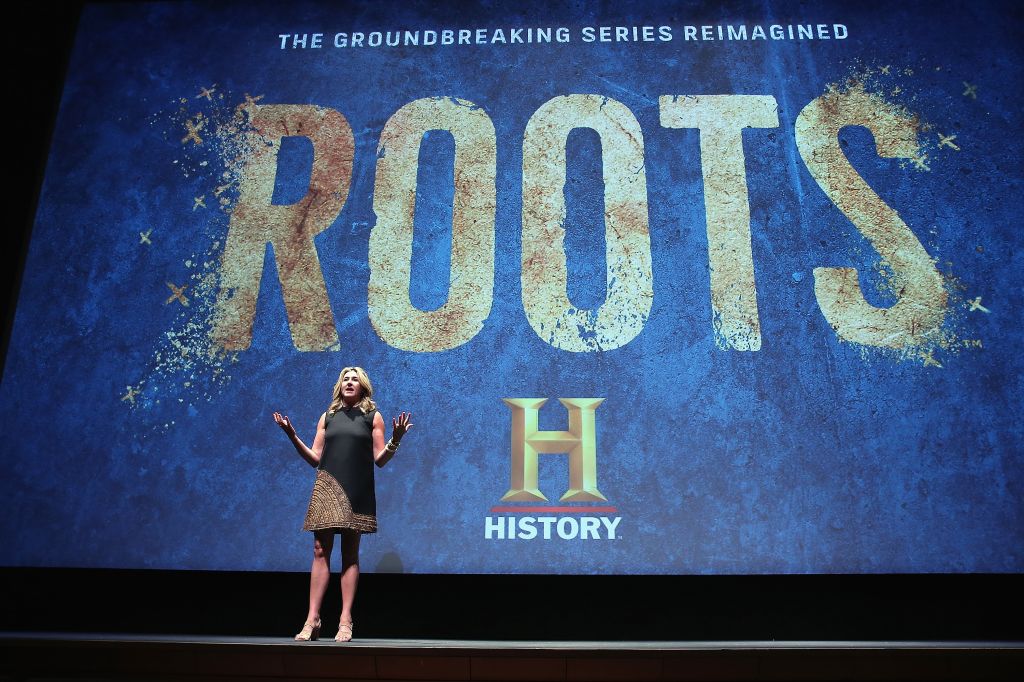
Source: Jemal Countess / Getty
I vividly recall the original iteration of the TV miniseries Roots. It was January 1977, and I was 17. Like most young people that age, my life was rapidly growing independent of my parents, who were increasingly consumed by the vagaries of their workplaces. Yet, when the series debuted, it was must-see TV in the Johnson household. We stopped what we were doing and watched it together and enthusiastically each night. We even cheered during the show, notable since we were often too darned middle class to cheer while watching football games on TV.
The miniseries cleaned up during awards season: 37 Grammy nominations (nine wins) and a Golden Globe. The Alex Haley historical novel, upon which the TV series was based, was awarded a Pulitzer Prize. It was also an unprecedented ratings success; all eight episodes rank among the 100 most-watched TV shows of all time. Four rank in the top 30 and the finale, almost 40 years later, still ranks as the third most-watched TV show ever. There were sequels and spinoffs, but for the last quarter century the phenomenon has been dormant.
That will end Monday when a remake of the classic series premieres on the History Channel (with simulcasts on sister networks Lifetime and A&E). It will run for four nights and, like the original, it features a star-studded cast including Laurence Fishburne, Forest Whitaker, Jonathan Rhys Meyers, Anika Noni Rose and Anna Paquin. Whereas the original was revolutionary for the story it told and who was in it; this remake is mostly interesting for how it tells the now-familiar story of Kunta Kinte, his adolescence in West Africa and subsequent enslavement, and the long circuitous journey of his offspring in America from the cusp of the Revolutionary War to the aftermath of the Civil War.
To tell this story was revolutionary in 1977. It presented African Americans through African-American eyes in a dramatic and historically significant context. At that time, black people on television were typically seen in the context of white society or setting up gag lines like Jimmy Walker’s “Dyn-O-Mite” exclamations. The presentations of slavery’s inhumane brutality flew in the face of my high school teachers in Dallas, who contended that slavery helped blacks and that more whites than Africans died during the slave trade. Yeah, small wonder cheers were heard from the Johnson townhouse.
The remake arrives into a much more complex and nuanced culture when it comes to racial representation. Films like Amistad and 12 Years a Slave have won accolades and awards for their depiction of the slave trade and the peculiar institution that it enabled. Ancestral investigation has become commonplace via shows like Finding Your Roots With Henry Louis Gates Jr. Spike Lee and John Singleton are widely recognized as two of the top Hollywood filmmakers and Shonda Rhimes is one of the most powerful people in television. And there are many TV shows that present African Americans from a black gaze rather than a white perspective.
The advances in the four decades since the original Roots set the bar very high for this remake. The reboot isn’t a corrective in any big-picture sense, but it is still a compelling story and the miniseries does a wonderful job telling it. British actor Malachi Kirby radiates a combination of dignity, ferocious ambition and pride as Kunta Kinte. Whitaker as Fiddler deftly conveys the ambivalent mindset and tightrope that slaves had to walk, laboring, but not threatening the slave owners and plantation foremen. Rose, who plays the adult Kizzy, imbues her character with an elegant pragmatism. And Regé-Jean Page as Chicken George steals almost every scene he’s in during episodes 3 and 4.
READ MORE: TheRoot.com
Article Courtesy of The Root
Picture Courtesy of Getty Images
Video Courtesy of The History Channel and YouTube

















